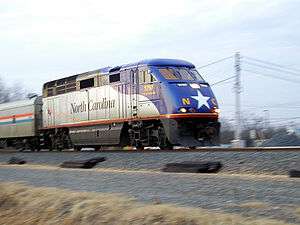North Carolina Department of Transportation
 | |
| Agency overview | |
|---|---|
| Formed | 1979 |
| Preceding agencies |
|
| Headquarters | Raleigh, North Carolina |
| Agency executive |
|
| Website | www.ncdot.org |
The North Carolina Department of Transportation (NCDOT) is responsible for building, repairing, and operating highways, bridges, and other modes of transportation, including ferries in the U.S. state of North Carolina.
History
The North Carolina Department of Transportation was formed in 1915 as the State Highway Commission. In 1941 the Department of Motor Vehicles (DMV) was formed under the NCDoT by an act of the General Assembly. The Executive Organization Act of 1971 combined the state highway commission and the DMV to form the NC Department of Transportation and Highway Safety. In 1979 "Highway Safety" was dropped when the North Carolina State Highway Patrol (NCSHP) was transferred to the North Carolina Department of Crime Control and Public Safety.[1]
Board of Transportation
The board governs the department and helps make decisions. Nineteen board members appointed by the governor, one each from one of the fourteen divisions, plus others representing specific functions of the department, meet once a month.[2][3][4]
Divisions of the NCDOT
Division of Motor Vehicles
The Division of Motor Vehicles (DMV) is a division of the NCDOT whose stated mission is to provide motor vehicle services, promote highway safety, and furnish timely and accurate information by providing excellent customer service, enforcing motor vehicle laws, and maintaining the integrity of official DMV records.[5]
Division of Highways
The Division of Highways is responsible for building and maintaining the second largest state maintained highway system in the nation, incorporating over 78,615 miles (126,519 km) of highways, and 18,540 bridges collectively spanning 376.98 miles (606.69 km).[6]
Division of Aviation
The Division of Aviation's mission is to promote the economic well being of North Carolina through air transportation system development and improved aviation safety and education.[7]
Division of Bicycle & Pedestrian Transportation
The Division of Bicycle and Pedestrian Transportation (DBPT) is a comprehensive operation, touching all aspects of bicycling and walking; whether designing facilities, creating safety programs, mapping cross-state bicycle routes, training teachers, sponsoring workshops and conferences, fostering multi-modal planning or integrating bicycling and walking into the ongoing activities of the Department of Transportation. Created in 1974 as a result of North Carolina bicycle program legislation and expanded to encompass pedestrian activities in 1992 as a result of federal legislation, the DBPT is the oldest comprehensive state program of its kind in the United States. [8]
Ferry Division
The Ferry Division is responsible for providing safe, cost-effective and dependable service for the traveling public. The Ferry Division operates eight routes connecting mainland North Carolina with various outer banks and islands along the coast of North Carolina.[9]
Public Transportation Division
The NCDOT Public Transportation Division helps North Carolina public transit systems move people. They don't operate buses, trains or vans directly – that's the responsibility of local transit systems – they help them operate safer and more effectively.The first division director was David C. Robinson, 1974-1979. He was succeeded by David King, then Sanford Cross, Miriam Perry, and Teresa Hart (the current director, appointed in 2012.)[10]
Rail Division

The Rail Division is responsible for operation of six Amtrak trains within North Carolina and works with the North Carolina Railroad Company, a state owned railroad that carries both freight and passenger rail service. The route is 317 miles (510 km) long and runs from Charlotte, North Carolina to one of the state ports at Morehead City, NC. The route passes through the cities of Charlotte, Salisbury, Lexington, Greensboro, Burlington, Durham, Raleigh, Goldsboro and on to Morehead City. The North Carolina Railroad trackage is currently leased to Norfolk Southern Railway. A small portion between Raleigh and Cary is co-operated with Norfolk Southern by CSX Transportation. The state operates no freight trains and all freight is handled by either CSX or Norfolk Southern. The state, however, does own the rolling stock used on the Piedmont under the reporting mark RNCX.
| Train Name | Train Number | Train Routing |
|---|---|---|
| Piedmont | 73/76 | Raleigh to Charlotte |
| Piedmont | 74/75 | Raleigh to Charlotte |
| Carolinian | 79/80 | New York to Charlotte |
See also
- North Carolina Ferry System
- North Carolina Highway System
- North Carolina Turnpike Authority
- Vehicle registration plates of North Carolina
References
- ↑ "NCDOT: History and Organization". Archived from the original on 2006-11-04. Retrieved 2006-11-15.
- ↑ "NCDOT: Board of Transportation". Retrieved 2012-04-06.
- ↑ "NCDOT: Division of Highways". Retrieved 2012-04-06.
- ↑ "NCDOT: Board of Transportation". Retrieved 2012-04-06.
- ↑ "NC Division of Motor Vehicles". Retrieved 2006-11-15.
- ↑ "NCDOT Quick Facts" (PDF).Retrieved on November 12, 2007.
- ↑ "NC Division of Aviation Mission & Vision".Retrieved on November 15, 2006.
- ↑ "NCDOT Division of Bicycle and Pedestrian Transportation".Retrieved on November 12, 2007.
- ↑ "NC Ferry Division".Retrieved on November 15, 2006.
- ↑ "NCDOT, Public Transportation Division".Retrieved on November 12, 2007.
External links
| Wikimedia Commons has media related to North Carolina Department of Transportation. |
- NCDOT Official Site
- NCDOT Rail Division Official Site
- NCDOT Division of Motor Vehicles Official Site
- NCDOT Ferry Division Official Site
- NCDOT Division of Aviation Official Site
- Publications (historic and current) from NCDOT